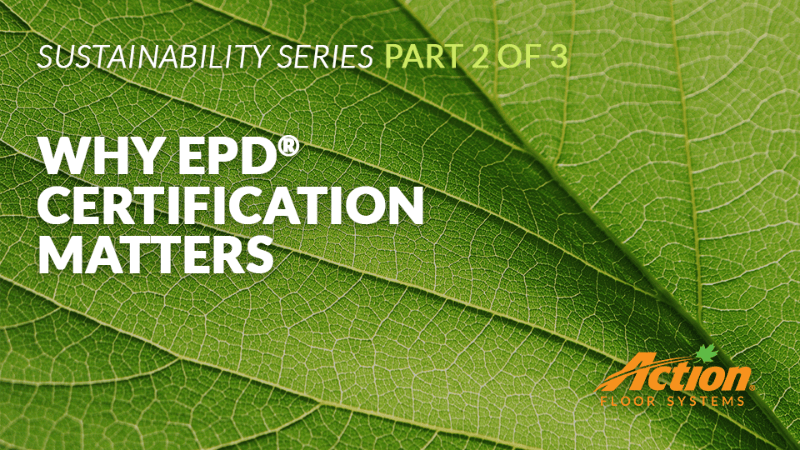 Industries across the globe are striving to become more sustainable in all aspects of the manufacturing process. From the raw materials used for production to the business practices of the company, the green initiative continues to spread globally.
Industries across the globe are striving to become more sustainable in all aspects of the manufacturing process. From the raw materials used for production to the business practices of the company, the green initiative continues to spread globally.
Part two of our series on sustainability discusses what an Environmental Product Declaration (EPD®) is and how this global certification is changing the way industries across the world operate.
At Action Floor Systems®, we believe reducing what goes into the environment starts with knowing what goes into our products. This evaluation process is known as an EPD®, an independently verified and registered document that communicates not only what a product is made of, but the manufacturing process and its impact on the environment. An EPD® evaluates a product’s impact on global warming, water pollution, ozone creation, and greenhouse gas emissions.
In addition to being carbon negative certified, Action Floors is proud to have the industry’s first complete EPD®. The certification audit performed by SCS Global Services, a leader in third-party environmental and sustainability certification and standards development, closely examines the Life Cycle Assessment (LCA), which SCS Global Services conducted along with the University of Wisconsin. While each study used different system boundaries for the assessment, both SCS Global Services and UW were contracted to conduct a life cycle assessment of our maple hardwood sport flooring.
In order to become eligible for EPD® certification, companies must satisfy the requirements of LCA, Product Category Rules (PCR), and meet the necessary standards set forth by the International Organization for Standardization (ISO).
Requirements for EPD® Certification
Life Cycle Assessment (LCA)
The first step in obtaining a certified EPD® is meeting the standards set forth in the LCA. This assessment carefully analyzes how much relative energy a company requires to produce a particular product. It also evaluates the magnitude of various environmental impacts, including global warming and carbon emission.
“In the simplest form, reviewing a company’s EPD® is similar to reading a food label,” Don Brown, Technical Director at Action Floors, said. “SCS Global Services uses a company’s EPD® to compare other EPD®s obtained by companies in the industry. This includes looking at the manufacturing process of its products, its environmental footprint, and what type of greenhouse gases it is putting in the air to best understand how sustainable or environmentally cognizant the company is.”
Product Category Rules (PCR) and the International Organization for Standardization (ISO)
In order to produce an EPD®, industry-wide product rules have to first be made. Since no two industries are the same, requirements for one industry may not apply to another. This is why committees are formed in every industry to determine what rules must be met for that industry to obtain a certified EPD®. These rules are known as Product Category Rules (PCR) and are an international standard (ISO) that SCS Global Services is required to follow.
ISO standards serve as requirements and guidelines for products and services. Following ISO standards ensures these products are high-quality, safe, and fit for their specific purpose.
Benefits of EPD Certification
There are three types of EPD® certification: self-proclaimed, industry-wide, and proprietary. While any company can claim to have an EPD®, verification from a third party, like SCS Global Services, is required to truly become ISO-certified. The verification process begins with a critical review of the LCA report. The report is formatted and translated into an EPD® template which is then verified by SCS Global Services. The report conforms to ISO 14025 requirements. Industry-wide EPD®s require third party verification, however, this type of EPD® doesn’t analyze individual companies and, instead, looks at the sustainable efforts of an entire industry.
Proprietary EPD® is the highest level of certification a company can achieve. Action Floors is proud to have the only hardwood sports flooring mill in the industry with a proprietary certified EPD®. Achieving this level of EPD® certification helps Action Floors offer a higher potential of LEED credits, as both programs share many of the same ISOs needed to earn a proprietary EPD® and to redeem various LEED points, including ISO 14044, ISO 14025, and ISO 21930.
Obtaining an ISO-certified or proprietary EPD® can help a manufacturer become a preferred supplier with designers and architects interested in green building projects. This certification serves as a distinct declaration of a product’s life-cycle environmental impact and helps architects, builders, and other professionals in the industry make decisions about which products will meet the expectations of a facility and its users.
Obtaining LEED Credits
Building owners that purchase products from companies that have an ISO-certified or proprietary EPD® can also earn valuable credits within the LEED (Leadership in Energy and Environmental Design) rating system. Architects, owners, and manufacturers make up the LEED program, which aims to produce and maintain healthy and environmentally friendly buildings. Companies can earn LEED credits by following a series of prerequisites and measurements that range from a company’s manufacturing process to indoor environmental quality.
From using less water and energy, to reducing the amount of volatile organic compounds (VOCs) in products, building owners can qualify for LEED credits based on how sustainable their buildings are. Each day, more than 1.85 million square feet of construction is LEED-certified.
Continuing Our Efforts in Environmental Excellence
At Action Floors, we are dedicated to producing materials that are not only high-quality, but highly sustainable as well. To learn more about our dedication to sustainable practices and the EPD® certification process, click here or contact your local sales representative today.
Our company is also proud to be FloorScore®-certified. This process, conducted by SCS Global Services, measures indoor air quality (IAQ) and the amount of VOCs emitted from hard surface flooring materials, adhesives, and underlayments. Learn more about how Action Floors became the only MFMA mill to acquire this certification and what this means in the hardwood sports flooring industry as we conclude our three-part sustainability series in our next blog.



















